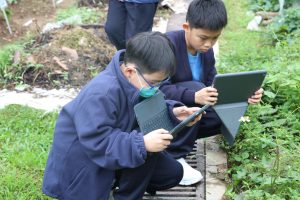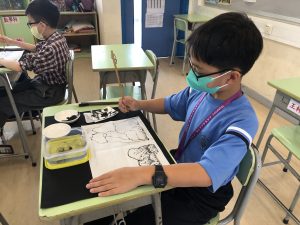Language is a fundamental skill for learning all subjects and is crucial for students' reading, writing, and communication abilities. In particular, Chinese is the students' mother tongue and is a language they frequently encounter in their daily lives. The learning content of language, such as reading comprehension, practical writing, classical Chinese studies, and grammar, often involves excessive memorization and reading, which can make students feel that it is profound and tedious. Making language learning lively and interesting, and breaking the fixed stereotypes, helps students build a solid language foundation and improve their ability to use language. Therefore, teachers need to devise effective teaching strategies to enhance the enjoyment of learning.
From Planning to Constructing School-Based Characteristic Curriculum
In the field of Chinese language learning, Tai Po Old Market Public School (Plover Cove) employs comprehensive teaching strategies and curriculum designs that meet students' needs, aiming to enhance students' interest in learning. By integrating the Chinese subject with cross-curricular reading, students can cultivate values and attitudes, local culture, human concern, literary literacy, and a global perspective through learning.
To align and implement these five core elements, Vice Principal Yeung Ho Kei mentioned that the school has developed and restructured the teaching units of the Chinese subject. The teaching team selects texts, and in addition to the textbook units, they will align with themes closely related to the content, incorporating classic literature readings and school-based classical poetry units to construct a comprehensive curriculum that caters to diverse learning needs. The curriculum planning utilizes the "TARGET" self-directed learning strategy, allowing students to start with pre-class preparation, followed by classroom teaching that focuses on key learning points, and then using post-class extension readings to deepen and consolidate learning, assisting students in constructing knowledge independently.
Connecting Life Experiences to Engage Students in Learning
To encourage students to participate in learning autonomously, one effective method is to connect the learning content with their life experiences to enhance their engagement. Vice Principal Yeung shared strategies to stimulate learning interest, noting that lower-grade teaching uses picture books and bridge books as teaching materials, arranging small tasks based on learning contexts to allow students to permeate and practice value education through "knowledge, emotion, intention, and action." For higher grades, the teaching materials will include classical Chinese and world-renowned literature for extended reading, such as "Journey to the West, "Souvenirs entomologiques," "The Little Prince," etc., and design interesting and challenging writing tasks according to different topics.

(For the school’s green farmland, teachers arrange for higher-grade students to go to the green farmland to describe the scenery during descriptive writing lessons.)
The teaching curriculum often encourages students to unleash their imagination and even engage in picture book extension writing activities, thereby fostering their creative thinking. For example, in conjunction with the text learning of " Monsters in the Forbiden City," activities such as visiting the Hong Kong Palace Museum are organized, allowing students to see various artifacts in person and respond to the curriculum through experiential learning.
Valuing Classical Literature to Enhance Students' Literary Literacy
Character education and understanding of Chinese culture should begin early, and learning classical texts helps enrich students' language knowledge while cultivating cultural literacy. Teacher Kong Sau-man, who teaches Chinese, also shared that the school has included a "Classical Poetry and Prose School-Based Curriculum" in the Chinese subject, allowing students to explore different types of classical poetry and prose, increasing their interest in classical literature. At the same time, classical stories are taught through drama, imparting knowledge of classical poetry and prose in an accessible manner. For instance, students perform in ancient drama theaters and participate in activities like "Tracing the Footsteps of Poets," where they play poets to explain the background of classical poetry writing. The school has also established a "Classical Language Ambassador Program" to train students to help promote Chinese culture in school-wide activities.

(In line with the theme of "Poetic and Artistic Expressions," students promote Chinese culture through landscape painting, creating an atmosphere of classical literature throughout the school.)
Additionally, classical poetry and prose can often give a dull impression, and the scenarios depicted in classical Chinese texts may seem distant from modern life. Therefore, Teacher Kong shared that when teaching the topic of "Four Analects," small classroom activities are incorporated to encourage students to exchange Confucius's quotes, inspiring them to learn "The Analects" independently.

(Students exchange Confucius's quotes and explain the reasons for their selections, encouraging them to learn and understand the meanings of classical texts through the activity.)
In addition to the curriculum planning in the Chinese subject, the entire school regularly holds Chinese Week activities, cross-curricular reading activities, and even field trips, allowing students to experience the joy of learning Chinese through experiences and practice, thereby increasing classroom engagement. Using games to enhance language knowledge can also stimulate learning interest, and teachers are encouraged to motivate students to use the "Chinese Master" platform provided by EdCity, making good use of the weekly updated language exercises and games to continue learning grammar, classical works, reading comprehension, and other language knowledge!
